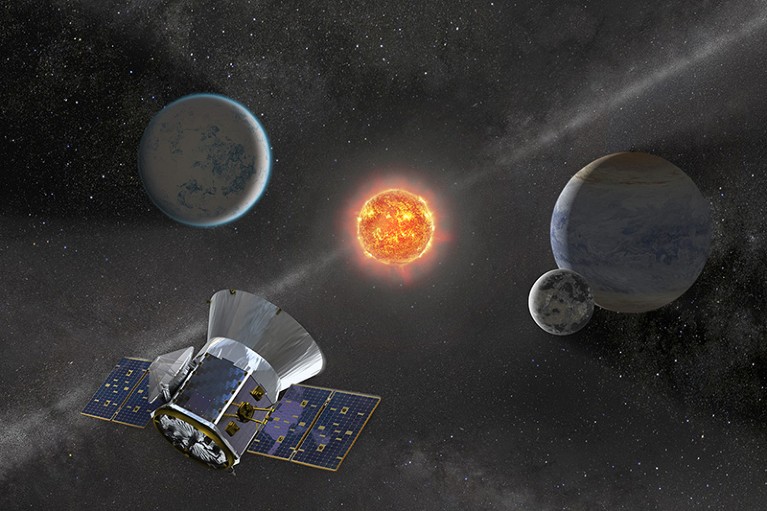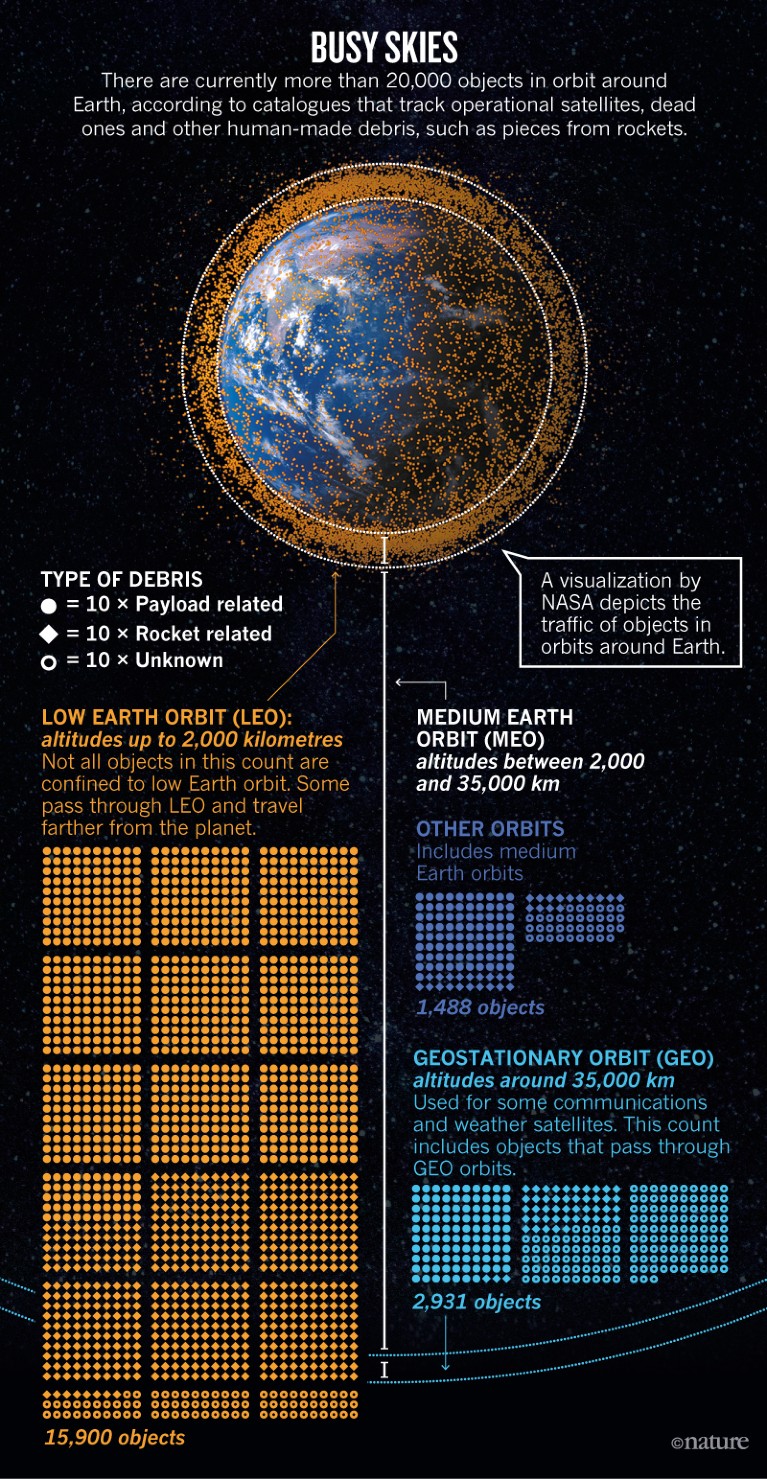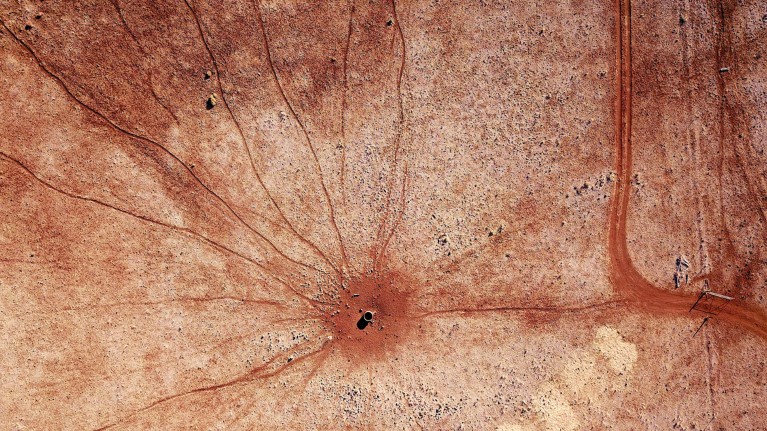Hello Nature readers,
Today we explore the results of the largest-ever peer-review survey, hear a recommendation for all-paper elections and reveal our pick of the best images, features and culture from the week in science.

An artist's illustration of NASA's latest exoplanet-hunting satellite searching nearby stars for other worlds.Credit: NASA/Goddard
TESS spots dozens of potential new worlds
Astronomers are studying 73 possible planets spotted by NASA’s Transiting Exoplanet Survey Satellite (TESS), which is hunting for worlds around nearby bright stars. The spacecraft observed 15,900 stars every 2 minutes in a slice of the southern sky during its initial run.
Nature | 3 min read
Peer reviewers unmasked
The largest-ever peer-review study reveals that there is growing “reviewer fatigue”, with editors having to invite more researchers to get each review done. A survey of more than 11,000 researchers also found that scientists in developed countries write nearly 2 peer reviews per submitted article of their own — nearly 3 times the rate of researchers in emerging nations.
Nature | 5 min read
Reference: Global State of Peer Review
5 hours |
The median time researchers spend writing a peer review. |
Only paper ballots are secure, say science academies
No Internet technology is safe, secure or reliable for voting, says the US National Academies of Sciences, Engineering, and Medicine. It recommends that all elections use human-readable paper ballots, and that voting machines that don’t produce a paper printout be removed immediately.
Nature | 2 min read
Reference: Securing the Vote: Protecting American Democracy
Australian fur-seal pup populations plummet
Australian fur-seal pup number have declined for the first time since monitoring began in 1986. Arctocephalus pusillus doriferus has been protected since 1975. Ecologists are not sure what is causing the drop, and worry that projections indicate the start of a sustained decline.
Nature | 2 min read
Reference: PLOS One paper
FEATURES & OPINION
Five steps to improve air-quality forecasts
Air pollution kills seven million people every year and destroys billions of dollars’ worth of crops. But air quality often goes unmonitored, and some of the hardest-hit cities have no alert systems. Four atmospheric scientists argue for the creation of a worldwide monitoring and modelling network that would give individuals and city managers the data to make better decisions.
Nature | 9 min read
Failsafes by Stewart C. Baker
A conference presentation about decentralized data preservation inspired author and librarian Stewart C. Baker’s science-fiction story Failsafes. “The real lesson is not: ‘Make technology last so we can rebuild civilization if it fails!’, but, ‘Care. Never stop caring,’” he says of his vision of a hidden cache of technology in a post-apocalyptic world.
Nature | 5 min read
Read more science fiction from Nature Futures.
Under the weather
Mothers of Invention is a witty and deeply thoughtful podcast hosted by former Irish president Mary Robinson and comedian Maeve Higgins. Its latest episode explores the impact of climate change on public health, and features the voices of women who are tackling the issue from underappreciated perspectives.
Mothers of Invention podcast | 46 min listen
One day inside a metabolic chamber
Science journalist Julia Belluz spent 23 hours eating, sleeping and exercising in a sealed room, with her every movement and mouthful being recorded. The result was a detailed map of how her body turns food into fuel: her metabolism. Belluz explores the mysteries of metabolism and its relationship to weight — and how metabolism myths are exploited by the diet industry.
Vox | 18 min read
BOOKS & ARTS
A journey through wine, spit and oil
Thanks to the moderate temperature and pressure we enjoy on Earth, we experience something rare in the larger Universe: a wide variety of liquids. Chemist Derek Lowe enjoys Mark Miodownik’s new book on the subject, particularly the glimpses of the hidden molecular world that underlies every object we see and handle.
Nature | 5 min read
A biologist’s road to the Nobel
In his new book Gene Machine, structural biologist and Royal Society president Venki Ramakrishnan tells the story of his path to the Nobel Prize. He thoughtfully embeds his trajectory in a wider meditation on how scientists make the decisions that lead to success or failure — and on how they struggle to solve complex problems. Ramakrishnan credits his wife, artist Vera Rosenberry, with keeping him grounded; on hearing of his prize, she said, “I thought you had to be really smart to win one of those!”
Nature | 6 min read
Five best science books this week
Barbara Kiser’s pick of the top five science books to read this week includes an ode to a tiny porpoise, a kaleidoscopic tour of light, and a visit to the fossil market.
Nature | 2 min read
INFOGRAPHIC OF THE WEEK

Source: ESA Annual Space Environment Report. Earth debris image: NASA Goddard Space Flight Center/JSC
The quest to conquer Earth’s space junk problem
SCIENTIFIC LIFE
The key to a happy lab? Read the manual
When she was preparing to launch her own lab, psychologist Mariam Aly wrote a lab manual to introduce her trainees to her philosophy for research and work–life balance, plus a wiki to go with it. She shares how she did it — and how she gets people to actually read it.
Nature | 6 min read
IMAGE OF THE WEEK

Credit: David Gray/Reuters
Parts of Australia are experiencing what might be the worst drought in their history. Record low rainfall has hit farmers especially hard. Here, tracks lead to a water tank in a parched paddock on a property near Gunnedah in New South Wales.
See more of the best science images of the month selected by Nature’s photo team.
